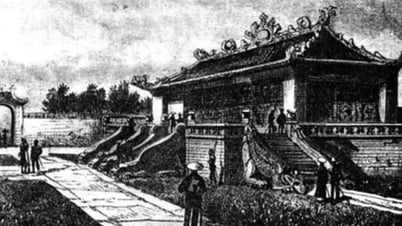
Many people drink coffee in the morning, but experts advise against drinking it right after waking up - Illustration photo
The following habits can affect your health:
Drink coffee late in the day
Drinking coffee late in the day can affect sleep, as it can disrupt the body's ability to fall asleep or stay asleep.
This is due to the side effects of caffeine - a natural stimulant found in coffee that affects the central nervous system and its sleep-disrupting effects can last for several hours after consumption.
Research has shown that drinking coffee within 6 hours of bedtime can affect sleep quality. Sleep is important for disease prevention, mood, concentration, and immune function. Therefore, it is recommended to limit coffee consumption within 6 hours of bedtime to ensure optimal sleep quality.
"It's okay to switch to decaf after 2 p.m. or whenever you typically feel sluggish in the afternoon," Melissa Prest, a registered dietitian, tells Health magazine.
Drink unfiltered coffee
Regular consumption of unfiltered coffees such as French press, Turkish coffee, espresso can increase LDL cholesterol levels - also known as bad cholesterol.
Compared to filtered coffee, unfiltered coffee contains higher levels of diterpene compounds, especially kahweol and cafestol, which have been linked to increased levels of LDL cholesterol in the blood. High levels of LDL cholesterol have been shown to increase the risk of stroke and heart attack.
"If possible, opt for machine-brewed coffee with a paper filter. Save unfiltered coffee for weekends or special occasions if you're watching your cholesterol," says nutritionist Prest.
Adding too much sugar to your coffee
Adding too much sugar and sweeteners to your coffee can spike your sugar intake, which can increase your risk of high blood pressure and chronic diseases like heart disease, cancer, and diabetes.
High sugar consumption also disrupts the balance of gut bacteria and may worsen symptoms of mental health disorders. Additionally, studies show that consuming too much added sugar contributes to weight gain and increases the risk of obesity.
Instead, enjoy your coffee black or lightly sweetened with a small amount of natural sweetener like raw honey, date syrup, or pure maple syrup.
Drink coffee as soon as you wake up
To optimize your energy throughout the day, limit your caffeine intake immediately after waking up. Drinking caffeine immediately after waking up can interfere with the activity of adenosine, a neurotransmitter that affects your circadian rhythm (your 24-hour biological clock) and sleep-wake cycle.
To minimize this effect, Debbie Petitpain, a spokesperson for the Academy of Nutrition and Dietetics, suggests drinking your first cup of coffee about 60 to 90 minutes after waking up.
“During that time, stay hydrated, get some natural light, and do some light exercise to help your body naturally wake up. You may find that your coffee works better, and you may even need less of it—just by adjusting the timing of your drink,” says Petitpain.
Use coffee as a meal replacement
Some people have a habit of drinking coffee instead of meals, either with the goal of losing weight or out of personal preference. Coffee can help with weight loss and overall fat loss, but it is not nutritious enough to replace a meal.
To ensure the benefits of coffee, it is recommended to use it after meals, such as breakfast to improve metabolism and control blood sugar levels better. It is recommended to consume a maximum of 400mg of caffeine in 1 day to ensure health safety.
Source: https://tuoitre.vn/uong-ca-phe-buoi-sang-khi-vua-ngu-day-khong-tot-cho-suc-khoe-20250712104828291.htm



![[Photo] National Assembly Chairman Tran Thanh Man receives Cambodian Senate President Hun Sen](https://vphoto.vietnam.vn/thumb/1200x675/vietnam/resource/IMAGE/2025/9/1/7a90c9b1c1484321bbb0fadceef6559b)
![[Photo] Chu Dau Ceramics – Proud of Vietnamese identity at Exhibition A80](https://vphoto.vietnam.vn/thumb/1200x675/vietnam/resource/IMAGE/2025/9/1/c62ab2fc69664657b3f03bea2c59c90e)
![[Photo] Celebration of the 65th Anniversary of the Establishment of Diplomatic Relations between Vietnam and Cuba](https://vphoto.vietnam.vn/thumb/1200x675/vietnam/resource/IMAGE/2025/9/1/0ed159f3f19344e497ab652956b15cca)
![[Photo] People eagerly wait all night for the parade on the morning of September 2](https://vphoto.vietnam.vn/thumb/1200x675/vietnam/resource/IMAGE/2025/9/1/0cf8423e8a4e454094f0bace35c9a392)
![[Photo] Solemn reception to celebrate the 80th anniversary of the National Day of the Socialist Republic of Vietnam](https://vphoto.vietnam.vn/thumb/1200x675/vietnam/resource/IMAGE/2025/9/1/e86d78396477453cbfab255db1e2bdb1)
![[Photo] General Secretary receives heads of political party delegations from countries attending the 80th anniversary of our country's National Day](https://vphoto.vietnam.vn/thumb/1200x675/vietnam/resource/IMAGE/2025/9/1/ad0cb56026294afcae85480562c2e790)































































































Comment (0)